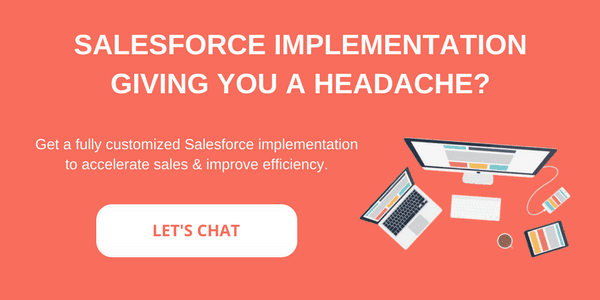We love Salesforce. Beyond its business intelligence and sales capabilities, one of Salesforce’s biggest strengths is how much you can customize it to be what you need it to be. If you’ve ever spent time looking at the Salesforce website, you would think customizing it would be fairly simple. Those beautiful product videos make the Salesforce platform look as slick and easy to use as possible. Which begs the question – is it really as easy as it seems?
It’s a loaded question but one we get asked a lot. Here’s our guide to Salesforce customization: When to DIY and when to call a pro.
When to Customize Salesforce Yourself
If your organization is small and you have a very specific need that Salesforce can solve, DIY customization might be the right answer for you. The actual interface where you build things is easy; it’s simply a matter of clicking the mouse or dragging and dropping.
The hard part is knowing which parts of Salesforce do what, what’s right to do for your company, and if you should even do it. Once you know that, the actual “how” part isn’t so bad. That being said, you need to have clear objectives and a clear plan before you dive in and start customizing.
Salesforce has lots of great tutorials to help you become more familiar with how to use the back end and how to make Salesforce do what you want it to do. We highly recommend spending time on Trailhead to learn Salesforce.
You should also consider your resources. If you have a person on hand with the technical expertise or you’re able to onboard a Salesforce admin, handling customization internally (aka DIYing it), is a good way to go.
When to Hire a Pro to Customize Salesforce
Hiring a pro really boils down to resources. When you don’t have the resources (time, expertise, staff, etc.) to do the work yourself, you should consider hiring a pro. But what kind of expertise and resources do we mean? How can you determine when you should try it yourself and when you should get help? To help give you a better idea, here are 3 common scenarios where you should consider hiring a professional.
#1. You have lots of data
Diving into the Salesforce tutorials can significantly increase your knowledge of the platform, but what the tutorials don’t teach you is the analyst side of things. If you have lots of data, setting up and customizing Salesforce can be tricky, because you need to know how to prepare it before you move it over.
There is a lot of analysis and aggregation involved in preparing data for a business intelligence tool. When you’re working with raw data, just importing it over can be a huge mess. You have to source it, integrate it and then format it properly. Otherwise you’ll end up with bad data that gets you nowhere.
READ: The 1 Solution that Business Intelligence Software Doesn’t Offer
If you have an analyst or a data scientist on hand, the work can be done internally. If not, you might want to consider hiring a pro.
#2. You use multiple software programs or legacy systems
A lot of people don’t realize that Salesforce can be integrated with all their business software. If your business has multiple software programs or back office operations, such as an ERP, then customizing Salesforce to integrate with those programs can be a huge undertaking.
If you have a technical person on hand who can take this on, then you don’t necessarily need to hire someone. If not, you should consider hiring a professional to do it for you. Integrating all your business software with Salesforce allows you to access everything you need in one place. It can save time and resources and allow you to get a big picture view of your company and processes.
READ: Solution to One of Business’s Common Complaints: CRM and ERP Compatibility
#3. You need to fully integrate across your company
Salesforce is not just for sales teams. It can be a beneficial tool for marketing, accounting, logistics, customer service, and even IT. Maybe you already use Salesforce within your sales department and want to better leverage the platform across the entire company. Or, perhaps you’re new to Salesforce and you want to integrate it with everything you do. Either way, hiring a professional might be the best approach.
Integrating Salesforce across your company is the best way to leverage the full power of Salesforce. Beyond time and resources, you really need to have a plan or strategy that maps out where you are now and how you’re going to use Salesforce to get where you want to be.
That sort of expertise is beyond having someone technical in house. According to RTS Labs founder, Jyot Singh:
“The ease of doing things in Salesforce is only part of the equation and arguably the lesser important part. It’s easy to click buttons and follow wizards. But to take a business requirement and figure out what the best approach is based on time and resources is not nearly as easy or straightforward. That’s how Salesforce is, too.”
In some cases, it might require developing entirely new Salesforce applications to meet your specific demands. When it comes to development, it’s really easy to over customize or focus on features that don’t improve your bottom line. In this case, you may need to hire a pro who can look at your business challenges and goals, identify opportunities for improvement, and build a customized solution for you.
So, should you DIY your Salesforce customization or hire a pro? According to our Salesforce MVP Adam Marks, the dividing line is whether or not you have expertise available to you. Some things in Salesforce are as simple as they look – and other customizable parts of Salesforce are quite sophisticated and require more expertise.
“From my perspective, the line in the sand is really straight forward: You hire a pro when you do not have the resources internally to do the work yourself. Typically this is for net new Salesforce clients or companies that do not have have staff to help manage some of the more technical aspects of running a business.”
Looking for help customizing your Salesforce implementation? Schedule a call with us, and let’s discuss how we can help.







